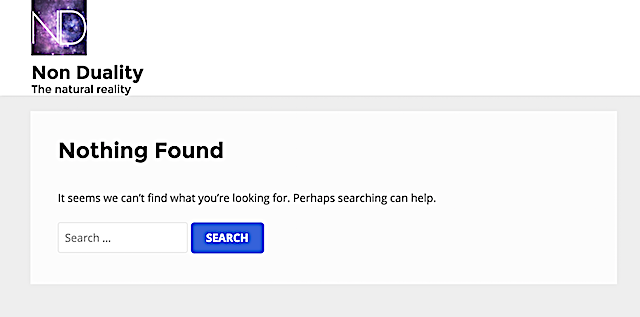
Ironic search result from the non-duality.one website. As they say “The paradox is that the ‘me’ cannot help but search, but what it’s looking for, a return to oneness, can never be found by the separate self. It will only be seen when ‘me’ falls away, but it will be seen by no one.”
Paul Kingsnorth has described 2016 as The Year of the Serpent. He writes:
History to [New Yorker editor David Remnick] is the continuing, inevitable path towards goals which he and his fellow ‘progressives’ consider to be just: the dissolution of the nation state, global human equality, a cosmopolitan world civilisation, fair and free trade, the spread of personal liberty and secular democracy to all corners of the globe. These goals are so obviously desirable that it is inconceivable that we should ever stop progressing towards them. Their triumph is tied in to the very fabric of time itself. The election of Donald Trump, who opposes at least some of them, thus represents a kind of anti-history. Not the real thing; an aberration which can’t last. Like a dammed river bursting its banks, progress will inevitably resume its natural course, sooner or later.
This is the humanist worldview, the one that most progressives still hew to. The “aberrant” election of Trump has not shattered their faith; just made them more determined to fight for the course correction needed to achieve their “obviously desirable” goals. It is doubtful that they will abandon this faith for the ‘hopeless’ one of collapsniks — the belief that even if these goals are desirable they will never be achieved, and it would be more useful to refocus on preparing for collapse than in vainly struggling to radically and quickly reform civilization’s systems and avert it. But it is as futile to debate this with humanists as to debate social and political morality with conservatives; there is no useful common ground.
And of course ‘collapsism’ — the moving past the second denial to accept the inevitability of civilization’s near-term collapse as part of the sixth great extinction — is also a kind of faith. We collapsniks cannot prove conclusively this inevitability; it’s something we have come to accept because it most makes sense in the context of our admittedly utterly incomplete and feeble knowledge of history, of human nature, and of how complex systems seem to work. This seems, to us, to make more sense intellectually and intuitively than other worldviews, even though we would rather believe we were wrong and that David Remnick, Charles Eisenstein and their fellow humanists were right.
My recent journey has been to try to see beyond this second denial to consider a third and fourth that seem, in some ways, to mirror the first two and bring us full circle to our current predicament. I’ve described them as follows:
- That with the useful evolution of our large brains came the unexpected emergence of ‘self’-consciousness — the illusion of separateness from all-there-is, and the resultant suffering, alienation and destructiveness that comes with this affliction. And there is no ‘path’ to liberation from, or ‘cure’ for, this affliction.
- That as the ‘self’ is an illusion, a construct, neither humans nor other creatures have free will, choice, control, agency, volition or responsibility for what we do. Nothing is inevitable, predictable or foreordained, but under the specific circumstances and situation in which each of us finds ourselves in each moment, we cannot do other than what we do.
Burkhard Bilger, writing about David Eagleman’s research on the nature of reality, quotes him as saying: “[What the self perceives as] reality is a tape-delayed broadcast, carefully [edited, synched and] censored before it reaches us.” Our understanding of what was, is a model pieced together by the brain, not something experienced directly. ‘We’ do not live in the present at all. Donald Hoffman asserts that reality is nothing like what we think it is. The simplified, artificial model of reality that the brain constructs is attuned to fitness (survival), not to truth. Seeing reality isn’t beneficial to our survival, he says. “Evolution has shaped us with perceptions that allow us to survive. But part of that involves hiding from us the stuff we don’t need to know. And that’s pretty much all of reality, whatever reality might be.” [Thanks to Kevin Barron for the link.]
Fellow collapsnik Brutus thinks it’s “cruel and pointless” to talk someone out of their faith in the reality of the self and free will. He criticizes Adam Bear who says:
A more speculative possibility is that our minds are designed to distort our perception of choice and that this distortion is an important feature (not simply a bug) of our cognitive machinery. For example, if the experience of choice is a kind of causal inference … then swapping the order of choice and action in conscious awareness may aid in the understanding that we are physical beings who can produce effects out in the world. More broadly, this illusion may be central to developing a belief in free will.”
Cruel and pointless, perhaps, but it’s in our nature to want to know the truth. Perhaps it’s just as cruel to convince people that collapse is occurring, if, as many now believe, there’s nothing we can do to avert it.
So, looking past all four denials: The sixth great extinction is at hand (1), and there’s nothing we can do about it (2). And this extinction is largely the result of the emergence of the illusion of the separate self — something we have always thought of as an evolutionary advance, but is actually an utterly useless and unnecessary affliction (3); worse, it underlies all suffering and most human destruction, and has no ‘treatment’ or cure (4).
Pretty dismal worldview, huh? Strangely, I find embracing it quite liberating. My job, now, is to chronicle civilization’s collapse, and to make sense of it any way I can. That may change, but I’m no longer searching for something that makes more sense.
PREPARING FOR CIVILIZATION’S END
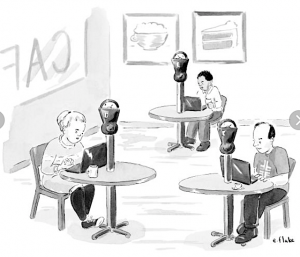
cartoon by Emily Flake in the New Yorker
Extinction Is the End Game: Xray Mike recaps the latest signs of the accelerating decline of civilization culture. And Ilargi riffs on the same subject. Excerpts from Ilargi:
Without the natural world that we were born into, or rather that our species, our ancestors, were born into, we have zero chance of survival. Because it is the natural world that has allowed for, and created, the conditions that made it possible for mankind to emerge and develop in the first place. And we are nowhere near making an earth 2.0; the notion itself is preposterous. A few thousand years of man ‘understanding’ his world is no match for billions of years of evolution.
Letting Go: Deb Ozarko describes what it means to let go of the belief that the collapse of our civilization can be averted or mitigated. Thanks to Wendy Bandurski-Miller for the link.
60ºC Variations in Arctic Temperatures Unleash Polar Vortex: While temperatures in the Canadian Arctic and North Pole have been up a stunning 36ºC warmer than normal, temperatures in nearby Greenland and Siberia have been 30ºC colder than normal. These are unprecedented anomalies, wreaking havoc on permafrost and local climate throughout the northern hemisphere. The impact of these “insane” and “terrifying” (in the words of climate scientists) extreme and enduring temperature shifts — glacial melt, severe storms, permanent disruption of the jet stream and ocean currents — cannot be predicted.
The End of Affordable Energy: Gail Tverberg explains how the demand for cheap-energy-fuelled growth will inevitably lead to economic collapse, as the affordable price for oil drops below the cost of its production. And as Ilargi explains, “What the world needs to do, but we very much doubt it will voluntarily, is not to look for other forms of energy to replace oil and gas, but to look for ways to use much less energy (90% or so) while still maintaining societies that function as best they can.”
Dave Talks About Collapse and Non-Duality: My latest interview with Carolyn Baker (audio-only version here).
60% of Global Wildlife Gone: The 2016 Living Planet report says that total populations of wild species have declined 60% from 1970s levels. The findings are based on long-term monitoring of some 3,700 vertebrate species spread across more than 14,000 distinct populations.
LIVING BETTER
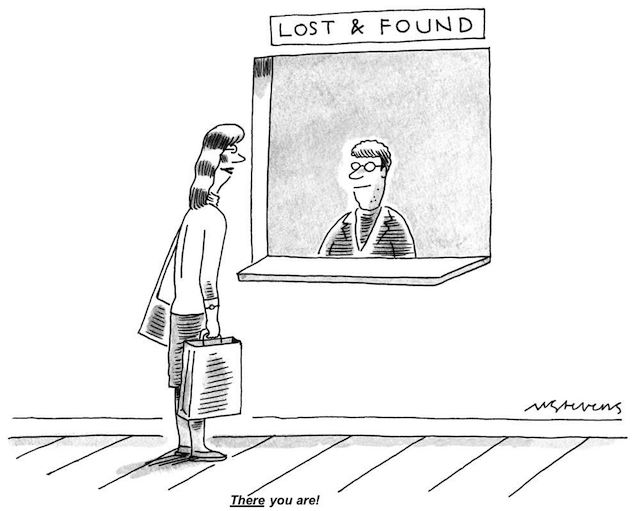
cartoon by Mick Stevens in the New Yorker
How to Live More Sustainably: My friend and fellow Bowen Islander Jae Mather explains the urgency of living more sustainably, hopeless as our situation may be.
Joe Bageant Explains Rednecks: Dear Joe, who died a few years ago, summarizes his explanation in Deer Hunting With Jesus why poor whites understandably and overwhelmingly vote Republican against their own best interests. Thanks to Bobby Arnold, another friend of Joe’s, for the link.
13 Sources of Free Images: No more need to dig through Google and Flickr for creative commons photos you can use; these images are completely free. Take that Getty!
The Best Indoor Plants For Air Quality: Ferns, palms and ornamental figs (but be careful if you have pets that nibble them). Thanks to Joe Mather for the link.
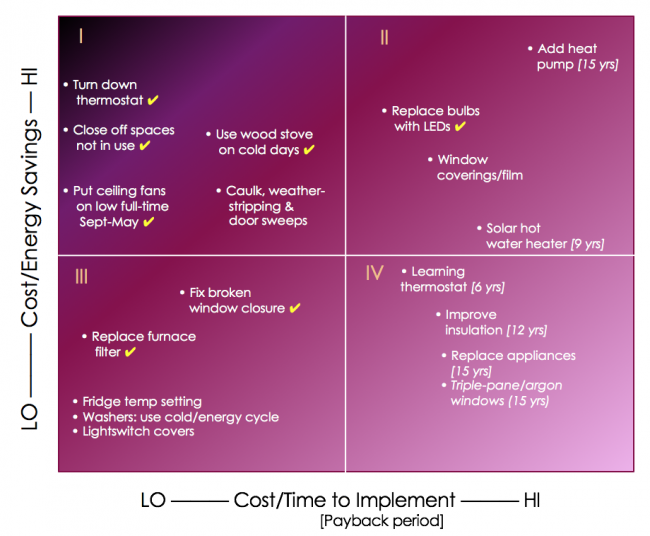
Dave Turns Down the Heat: My latest interview in the Bowen Island Undercurrent explains how (methods checked above; I’ve just put plastic film on my largest heat-loss skylight as well) I’ve reduced my energy consumption by 30% this year.
POLITICS AND ECONOMICS AS USUAL
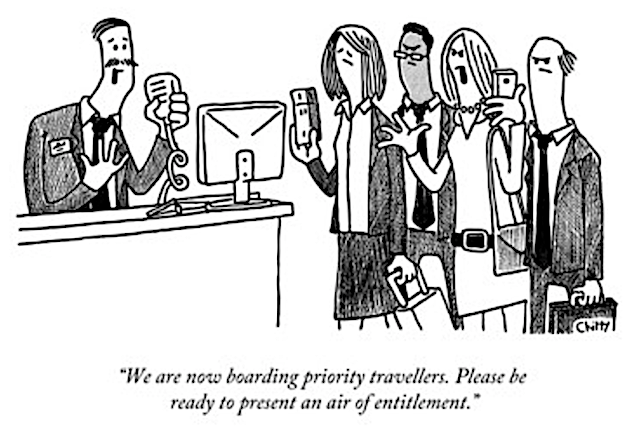
cartoon by Tom Chitty in the New Yorker
Nothing Much to Say About Trump: Susan Sarandon explains why many progressives refused to support Hillary Clinton. Trump’s election was, like the Brexit vote, an angry, fed-up, frightened protest against a sense of powerlessness (check out the link to the brilliant Trump TV ad in this article from Paul, and this amazingly perceptive FoxNews analysis) in our global, increasingly unequal economy [thanks to Tom Atlee for these two links]. And like Brexit, it was an anxious revolt by rural/suburban residents against the apparent power of those in the ‘scary’ cities [thanks to Tree for this link]. Like much of the political discourse we are seeing globally, and will see more in the year to come, this protest is totally incoherent and disorganized, but we ignore it at our peril. While some short term damage by the latest clown-elect is probable, the election of the sociopathic Trump, like the election of the equally damaged Cheney (running the country in the guise of Bush) in 2000, is unlikely to change anything for long [thanks to George Por and Deanna Pumplin for these links]. He might even opt to try improving the US’s crumbling infrastructure. As Richard Heinberg and Rob Hopkins have both written: Before Trump, build resilient local community; after Trump, build resilient local community.
Environmental Journalism Under Siege: The journalists who covered the coordinated protests against the Alberta Tar Sands face prison time of up to 30 years for doing so. And in North Dakota, award-winning journalist Amy Goodman faces similar charges.
Is Your Anxiety Profitable?: Interesting article claims that not only do product-pushers exploit your sense of anxiety, you would be much less anxious if they weren’t doing so. The argument is that life hasn’t become any more stressful in the last century. So the reason there is so much more stress-related illness is that it’s profitable.
The Crimes of Empires: Arundhati Roy and Daniel Ellsberg meet Edward Snowden. Thanks to Jon Husband for the link.
Understanding the Alt-Right Movement: A fascinating and thorough if somewhat slanted explanation of a worldview honed from pain, frustration and fear. Thanks to KMO for the link.
Chronic Pain Patients “Collateral Damage” in War on Opioids: While bad street drugs laced with synthetic fentanyl are causing hundreds of overdose deaths, long-term chronic pain patients are being punished, deprived of vital medications, and mistreated by health care workers as “drug seekers” in the medical and political establishment’s zeal to try to reduce the “epidemic” of toxic street drugs. As always in dealing with addiction, they are taking exactly the wrong approach. Thanks for Daphne Bramham for telling the inconvenient truth.
Canadian Greens and NDP Continue to Self-Destruct: In their thirst for political power, Canada’s Green Party leaders continue to purge progressives who advocate radical positions on environmental, political and social issues, threatening to make them just another do-nothing centrist party afraid to rock the corporatist boat. Likewise, the BC NDP is waffling on opposing pipelines, dam sites and mining activities, afraid of alienating its labour base. As for the Trudeau Liberals, most of us knew before the election that the charismatic leader was just a Canadian Obama, a Harper-lite, with no interest at all in environmental protection except where he can get short-term political gain from token environmental posturing. There is now no true pro-environment party in Canada.
FUN AND INSPIRATION
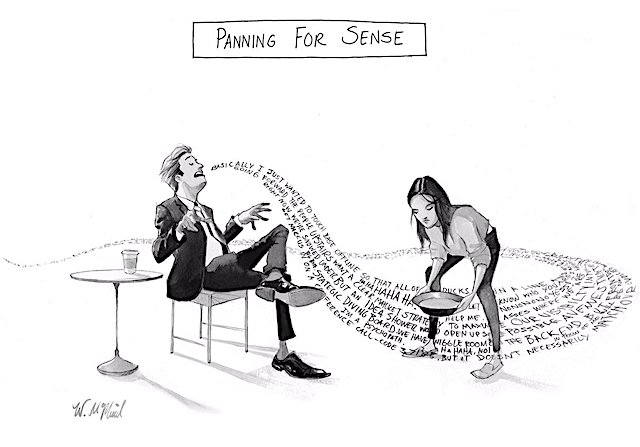
cartoon by Will McPhail from the New Yorker
A $15 Toy That Will Make You See the World Differently: It’s not really a toy, but this LED-lighted 120x power microscope will astonish you with what it shows you of the world right under your nose. I’m buying one for each of the ‘kids’ in my life.
How Wolves Change Rivers: A short 5-minute video explains how complex systems involve millions of variables connected in unfathomable ways: How the reintroduction of a few wolves enriched and changed an entire ecosystem in just a few years.
Tim Minchin is Not Perfect: A stunning song poignantly explains who we are and what we are not. If you like your Tim edgier, try If I Didn’t Have You.
How Smart Is an Octopus?: Probably as smart as many mammals, though no one really understands how. I’m reading Sy Montgomery’s Soul of an Octopus at the moment, so I might write more about this. Thanks to Nancy White for the link.
Earth Weather, Beautified: A stunning near-real-time visualization of global weather conditions (configurable by clicking bottom left). Thanks to Paula Love for the link.
Is Time Real?: David Eagleman suggests that the brain constructs what we perceive as ‘time’ to make sense of discontinuity, in a similar way to how it constructs what we perceive as ‘colour’ to make sense of electromagnetic radiation — Neither is ‘real’. See the quote below by Mark Helprin for another way of seeing this.
Jim Page and the Power of Music: The definitive protest singer Jim Page (who’s promising some new songs soon on Standing Rock) explains why he does what he does.
THOUGHTS OF THE QUARTER
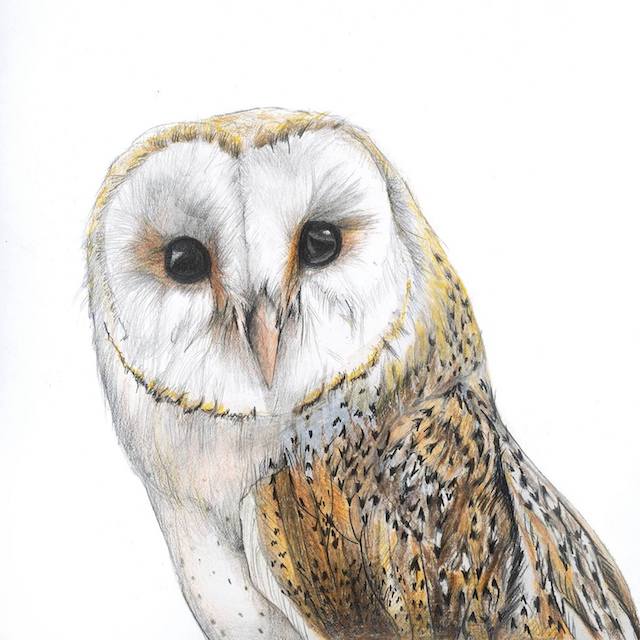
barred owl sketch by the amazing Rebecca Clark
From WH Auden (thanks to Bill Watson for the link): The Labyrinth:
Anthropos apteros for days walked whistling round and round the Maze,
Relying happily upon his temperament for getting on.
The hundredth time he sighted, though, a bush he left an hour ago,
He halted where four alleys crossed, and recognized that he was lost.
“Where am I? Metaphysics says no question can be asked unless
It has an answer, so I can assume this maze has got a plan.
If theologians are correct, a Plan implies an Architect:
A God-built maze would be, I’m sure, the Universe in miniature.
Are data from the world of Sense, in that case, valid evidence?
What in the universe I know can give directions how to go?
All Mathematics would suggest a steady straight line as the best,
But left and right alternately is consonant with History.
Aesthetics, though, believes all Art intends to gratify the Heart:
Rejecting disciplines like these, must I, then, go which way I please?
Such reasoning is only true if we accept the classic view,
Which we have no right to assert, according to the Introvert.
His absolute pre-supposition is–Man creates his own condition:
This maze was not divinely built, but is secreted by my guilt.
The centre that I cannot find is known to my Unconscious Mind;
I have no reason to despair because I am already there.
My problem is how not to will; they move most quickly who stand still;
I’m only lost until I see I’m lost because I want to be.
If this should fail, perhaps I should, as certain educators would,
Content myself with the conclusion; in theory there is no solution.
All statements about what I feel, like I-am-lost, are quite unreal:
My knowledge ends where it began; a hedge is taller than a man.”
Anthropos apteros, perplexed to know which turning to take next,
Looked up and wished he were the bird, to whom such doubts must seem absurd.
By Mark Helprin, from Winter’s Tale [thanks to Eleftheria for the link]:
Nothing is random, nor will anything ever be, whether a long string of perfectly blue days that begin and end in golden dimness, the most seemingly chaotic political acts, the rise of a great city, the crystalline structure of a gem that has never seen the light, the distributions of fortune, what time the milkman gets up, the position of the electron, or the occurrence of one astonishing frigid winter after another. Even electrons, supposedly the paragons of unpredictability, are tame and obsequious little creatures that rush around at the speed of light, going precisely where they are supposed to go. They make faint whistling sounds that when apprehended in varying combinations are as pleasant as the wind flying through a forest, and they do exactly as they are told. Of this, one is certain.
And yet, there is a wonderful anarchy, in that the milkman chooses when to arise, the rat picks the tunnel into which he will dive when the subway comes rushing down the track from Borough Hall, and the snowflake will fall as it will. How can this be? If nothing is random, and everything is predetermined, how can there be free will? The answer to that is simple. Nothing is predetermined, it is determined, or was determined, or will be determined. No matter, it all happened at once, in less than an instant, and time was invented because we cannot comprehend in one glance the enormous and detailed canvas that we have been given – so we track it, in linear fashion piece by piece. Time however can be easily overcome; not by chasing the light, but by standing back far enough to see it all at once. The universe is still and complete. Everything that ever was is; everything that ever will be is – and so on, in all possible combinations. Though in perceiving it we image that it is in motion, and unfinished, it is quite finished and quite astonishingly beautiful. In the end, or rather, as things really are, any event, no matter how small, is intimately and sensibly tied to all others. All rivers run full to the sea; those who are apart are brought together; the lost ones are redeemed; the dead come back to life; the perfectly blue days that have begun and ended in golden dimness continue, immobile and accessible; and, when all is perceived in such a way as to obviate time, justice becomes apparent not as something that will be, but something that is.





Saw that you linked to my blog post entitled The Postdictive Illusion. You wave away my objections to perspectives you share with Adam Bear, which I’m happy to accept in calm disagreement. The matters under discussion are unresolved after millennia of devoted inquiry. Yours is an interpretation that goes through and beyond to arrive at a place of hopeless liberation. That irony is not lost on me, and I sometimes wish I could reach similar conclusions, yet my truth-seeking leads me along different paths. Be well.
Thanks B. I enormously appreciate your writing, as your path, like mine, seems completely unique. May yours take you to a place to peace, love and joy.
Hi Dave. I have found the “Mind Over Reality” theory very interesting, ironic and satisfying.
Is denial the secret of humanity’s success?
“But to Ajit Varki, an oncologist and specialist in human origins, and Danny Brower, a geneticist who died in 2007, denial is something altogether different: a prerequisite for human intelligence.
That startling premise is explored in their book Denial: Self-Deception, False Beliefs, and the Origins of the Human Mind”.
“This mind-over-reality theory is one explanation for why we are the only surviving human species, Dr. Varki said. (The book describes the process as a kind of “intellectual arms race.”)”
“In fact, if his theory is correct, it might also explain why we haven’t found intelligent life on other planets: Perhaps life there evolved much as it did here – depending on creatures that became fully aware of other minds and their own mortality, developed the denial mechanism and then blithely wiped themselves out, taking everything else along for the ride.”
http://www.theglobeandmail.com/technology/science/is-denial-the-secret-of-humanitys-success/article12428138/
Entire audio book on youtube.
https://www.youtube.com/watch?v=j8P5cekzg60
Doomer thinking does nothing to help ‘save the world’. Highlighting the things that could very well happen is useful to help raise the alarm, but obsessing on the problem beyond that does nothing to solve it. I will continue to fight for a civilized world, even if I end up going down with it.
daoudjan, marshl!
Thanks so much for this; forwarded to a number of friends…but i have no idea if it can be taken in…i’m glad you continue saying this all!
warm greetings from down the west coast of what will soon be continental Trumpestan